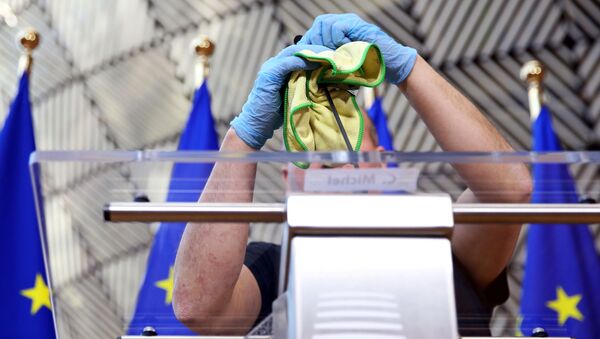European Commission President Ursula von der Leyen has unveiled the EU’s roadmap for lifting the COVID-19 national lockdowns, calling for a "coordinated exit from the confinement measures".
Presenting a 14-page document at a Brussels press conference on Wednesday, she stressed that a "tailor-made approach in every individual member state" is needed and that several preconditions should be met before governments lift the lockdowns.
These include observing a considerable reduction in the spread of COVID-19 over a sustained period of time as well as providing sufficient health system capacity to deal with coronavirus-stricken patients.
Additionally, every EU member state should deploy a relevant surveillance and monitoring capacity, such as large-scale COVID-19-related testing.
Von der Leyen underscored that withdrawing from the lockdowns should be "gradual and consolidated”, adding that member states ought to communicate because "the virus knows no border".
She warned that "insufficient coordination” during the exiting process may pose a “risk of creating negative effects for all member states and most likely increases tensions between them”.
“Although it is clear that the path back to normalcy will take a long time, it is also obvious that we cannot maintain these extraordinary restrictions indefinitely”, the European Commission president pointed out, warning at the same time that “we will have to live with the virus until a vaccine has been developed".
Also taking part in the Wednesday press conference was European Council President Charles Michel, who underlined that the COVID-19 pandemic had highlighted "the absolute necessity to develop a massive investment strategy" and that the virus' fallout reflected the "external responsibility of the EU".
EU in 'Danger of Dying Out' Over Coronavirus, Economy Commissioner Warns
The roll-out of the bloc’s roadmap comes after EU Economy Commissioner Paolo Gentiloni warned in late March that “the European project is in danger of dying out” as member states remain at odds over the bloc’s economic measures aimed at addressing the impact of the COVID-19 outbreak.
“It is clear that if the economic differences between European countries, rather than shrinking in the face of a crisis like this, instead increase, it will be very difficult to keep the European project together", Gentiloni told Italy’s Radio Capital.
He spoke after Berlin and other northern EU states rejected a proposal for a so-called "corona bonds scheme" tabled by nine countries, including Italy, Spain, and France, which stipulates the bloc creating a joint borrowing system that would help countries cope with the damage caused by the coronavirus pandemic.
According to the World Health Organisation, as of Tuesday, the number of confirmed COVID-19 cases in the EU has increased to 943,272, with 80,712 fatalities.



